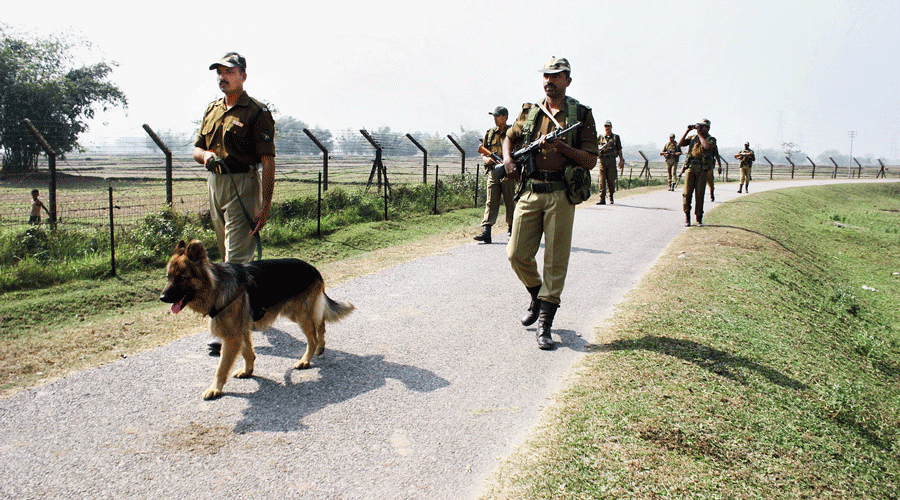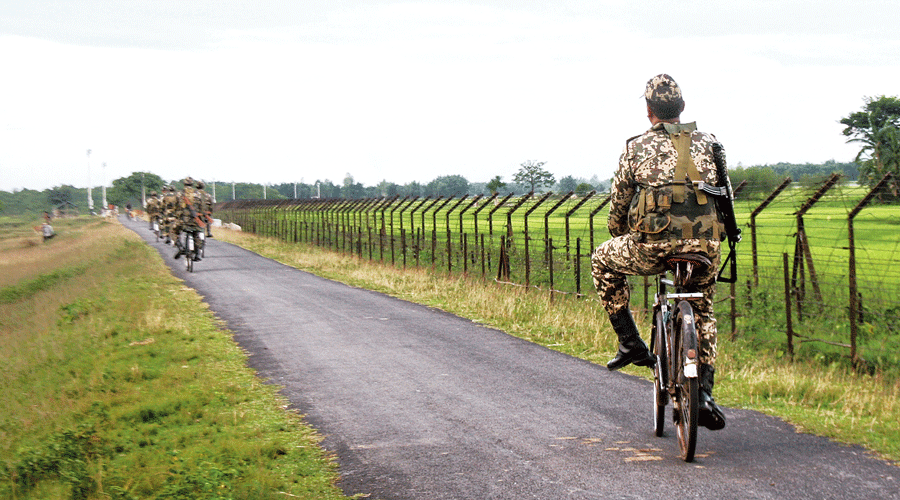The BSF is preventing the cultivation of jute near the Bangladesh border in Dinhata subdivision of Cooch Behar, apparently to ensure that it can have a clear view of the border, farmers have alleged.
A security expert confessed himself perplexed why the BSF would deem such a measure necessary when it has access to high-tech monitoring devices.
Several farmers have complained to the sub-divisional officer (SDO) of Dinhata that jawans have forcibly seized their jute seeds.
A Union home ministry order bans the cultivation of any crop that grows above a height of three feet on any plot beyond the border fences, that is, on the 150-yard-wide stretch between the fences and the zero line. Jute plants grow above 10 feet tall.
“We don’t grow jute beyond the fence because of this ban. From this year they are not allowing us to grow jute even within the Indian mainland,” said Shafiul Mian, a farmer from Gitaldaha in Dinhata.
Shafiul said: “They say that as jute plants grow up to 10 to 12 feet, they don’t get a clear view of the border. When we asked to see the orders, they could not produce any documents. But it’s difficult to argue with them.”

BSF personnel patrol along the India-Bangladesh border in north Bengal. File picture
Some farmers said the BSF’s current jute ban now extended up to 150 yards inside the fences.
The BSF could not be reached for comment.
The controversy comes a week after BSF constables beat up a young farmer for being on the roads after 6pm — an unofficial curfew deadline imposed by the force in Dinhata — and then thrashed villagers who protested.
The state administration, flooded with complaints of BSF “excesses” for months, had promptly asked the force to withdraw the unofficial curfew and visit the border villages every fortnight for confidence-building talks.
SDO Himadri Sarkar said he had approached the state government to find out whether there was any official restriction on cultivating jute in areas inside the border fencing.
“Once we receive the communication, the matter will be taken up with the BSF,” Sarkar said.
Several farmers told The Telegraph that BSF jawans randomly frisked people to check whether they were carrying jute seeds.
“This is the sowing season. The plants start growing in a couple of months and monsoon is the harvesting time.... If they take the seeds away, how can we grow jute?” a farmer said.
“A farmer can earn around Rs 25,000 by selling the jute produced on one acre of land,” said Abdur Rauf, a Forward Bloc leader who has been organising farmers’ movements on border issues for years.
A senior police officer who has served in several border districts in Bengal said that one didn’t need a clear physical view of the terrain for surveillance nowadays — it could be done from inside a room using gadgets like CCTV cameras and drones.
“Senior BSF officers often speak about upgrading their surveillance processes through night-vision cameras, sophisticated binoculars and the illumination of border stretches. But this move proves that the BSF still depends on old systems of surveillance,” the police officer said.
Cooch Behar is a leading jute-growing district, with about 80 per cent of its more than 5 five lakh farmers cultivating the crop.
Bengal accounts for about 83 per cent of India’s jute production. The state produces about 85 lakh bales (one bale equals 180 kilos) of raw jute that serve as the principal raw material for mills located in the southern districts.
“If the (border) ban is actually implemented, the supply of raw jute will be affected and the industry will suffer,” a jute industry insider said.
A senior district official said that after the thrashing of the young farmer last week, the jute ban would further worsen the relationship between the BSF and the local people.
“Jute is a major source of earning in this region,” he said. “If they (BSF) keep antagonising the people living along the borders, they will not get the local cooperation without which they cannot carry out their job.”
Local political leaders have joined the protests. “This is another example of the BSF’s highhandedness,” said Udayan Guha, Trinamul MLA from Dinhata.
“This is a matter of the farmers’ livelihood; the BSF cannot impose such bans.”











